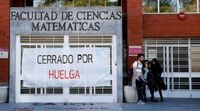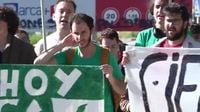On April 28, 2025, the Madrid public education system witnessed a significant mobilization as students, professors, and administrative staff from six public universities, including the Complutense University of Madrid (UCM), participated in a historic general strike. This protest, which had not occurred in the region for 12 years, aimed to address what organizers described as the "economic suffocation" of public education and to oppose the proposed Law on Higher Education, Universities, and Science (LESUC) being prepared by the regional government.
In a striking visual protest, professors at the Complutense University covered the facade of the Faculty of Physics with a large mural made from over 400 research posters presented at various congresses. The mural carried the powerful slogan, "Public university, investment in quality." This initiative was part of a broader campaign organized by UCM por la Pública, a collective advocating for public universities.
The strike was set against the backdrop of a looming law that, according to critics, threatens to significantly reduce public funding for universities. The new legislation would see the regional government contribute only 70% of the necessary funding, forcing institutions to source the remaining 30% from external sources, including private investment funds. This shift raises concerns about increased corporate influence over academic decisions, as noted by UAM por la Pública, which warned of a potential "frontal attack" on university autonomy.
As part of the strike, a demonstration was scheduled to begin at 18:00, starting from Atocha and making its way to Sol, under the rallying cry "Let's save public education." Organizers expected participation from a wide array of groups, including student organizations, unions, and educators, reflecting a united front across all educational levels—from early childhood through to university.
The protests also highlighted a growing discontent with the financial management of public universities in Madrid. Last year, only €5,900 was allocated per student, starkly lower than the national average of €7,000. Critics, including the Councilor for Education, Emilio Viciana, labeled the strike as "lamentable" and "unnecessary," arguing that the government is already working on a funding model with university rectors.
Despite the Councilor's claims, many within the education sector feel that the proposed changes will lead to a "mercantilization" of education, where less profitable courses could be cut, and the quality of education diminished. The platform Menos Lectivas, which also participated in the strike, expressed that the current agreement between the Ministry of Education and various unions was inadequate, describing it as "a few crumbs" that had been rejected by many educators.
The strike was marked by pickets and informational gatherings across various campuses, particularly at UCM and the Autonomous University of Madrid (UAM). Students donned green shirts and held banners advocating for public education, emphasizing the need to resist what they see as a systematic dismantling of public educational institutions.
Many professors and students shared their concerns about the impact of the proposed legislation. Carlos Gil, a professor at UCM, noted that the entire administration unit of the Politics library had gone on strike, highlighting the widespread dissatisfaction among faculty members. He remarked, "We have not seen a strike with such adherence since the 2012 crisis," indicating the gravity of the current situation.
In the days leading up to the strike, students engaged in various forms of protest, including assemblies and visual displays in their faculties. A notable event occurred on April 21, when approximately 100 professors and students plastered the Faculty of Physics with posters advocating for increased funding for science, setting the stage for the larger mobilization.
While some faculties reported low participation in the strike, others, particularly in the humanities and social sciences, saw significant turnout. For instance, the economics faculty, which has historically been less active in protests, witnessed a surge of students participating in the "pasacampus," an initiative designed to unite students in support of the strike.
Within the context of this strike, there were also discussions about the precarious conditions faced by educators. Many associate professors earn between €500 and €600 a month, a wage that some students likened to that of a cleaner. This situation has led to calls for better pay and job security within the academic community.
The strike is not solely about funding; it also addresses broader issues of autonomy and academic freedom. Organizers fear that the proposed law would allow greater governmental control over university budgets and decision-making processes, undermining the independence that institutions require to thrive.
In response to the protests, the regional government reiterated its commitment to funding education, with Viciana asserting that no university would receive less financial support than in previous years. However, many in the education sector remain skeptical, fearing that the proposed changes signal a shift towards a more privatized and less accessible education system.
As the strike unfolded, it became clear that the Madrid public education community was united in its call for change. With demands for increased funding, better working conditions, and a commitment to maintaining public education as a right rather than a privilege, the protests represented a critical moment in the ongoing struggle for educational equity in Spain.
As the sun set on April 28, the streets of Madrid were filled with chants and banners, a vivid reminder of the collective resolve of students and educators alike to fight for the future of public education. The outcome of this strike remains to be seen, but its implications could resonate far beyond the borders of Madrid, influencing educational policies across the country.





